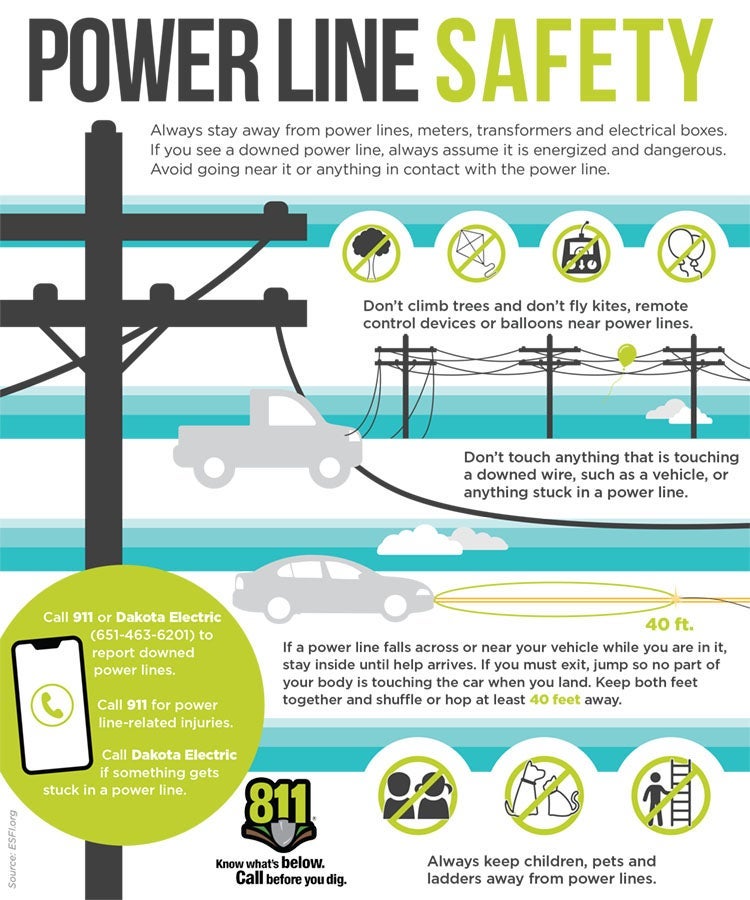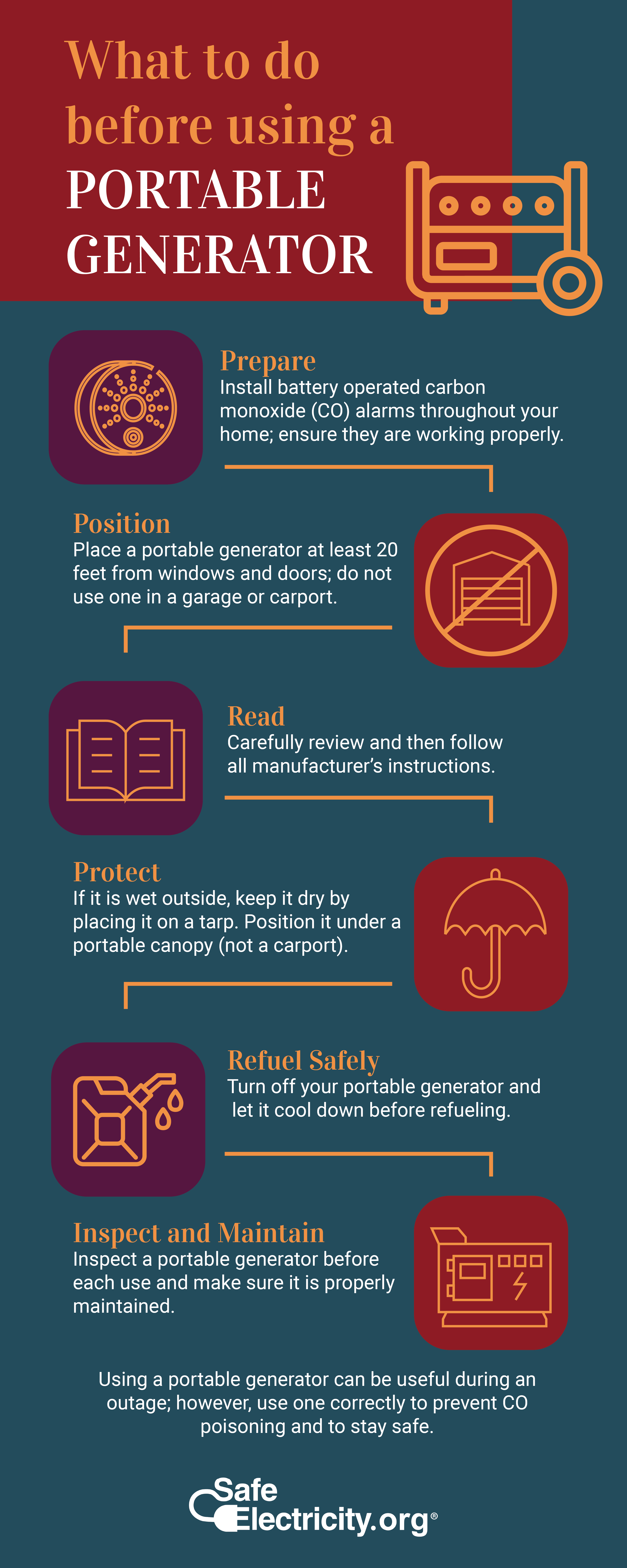If you are experiencing a power outage, please call our office at 620-227-2139 or 800-279-7915. Thank you!
Knowledge is as powerful as electricity. Electricity always seeks the shortest path to the ground and looks for a good conductor, such as metal, that transmits it easily. The human body is also a good conductor because it is about 70% water. If you touch anything with a live current, a bare wire or faulty connection, electricity will pass through you to the ground. Depending on the strength of the current, the electricity could seriously injure or fatally shock you.
Victory Electric is more than your source of energy. We are also a valuable energy resource. That is why we provide our members with information that is as reliable and useful as the electricity we supply. Information ranges from safety tips to education to the latest energy efficient information.
Safety Matters
Statistics from the U.S. Consumer Product Safety Commission show that nearly 400 people are electrocuted in the United States each year. Fortunately, most electrical fires and incidents can be prevented. Electrical safety awareness and education among members, families, employees and communities will prevent electrical fires, injuries, fatalities, and property loss.

It is important to use extreme caution and stay away from overhead power lines. Electricity is always trying to go somewhere. It goes easily through materials like metal, water, trees, the ground, and things with water in them – like animals and PEOPLE.
Call us. Never touch a power line with a part of your body, or with any object – and never cross a substation fence. Never cut trees or vegetation near overhead power lines until you have met with a Victory Electric representative. Here are some helpful tips to keep you safe:
- Look up! Always examine your surroundings for power line locations before doing any outside work.
- Downed power lines: Always assume downed power lines are “live” and stay away. Do not attempt to remove anything in contact with a downed power line or drive across a downed power line. Power lines are not insulated like power cards.
- Electricity and water don't mix. Keep electrical appliances and toys away from water, including rain, wet ground, swimming pools, sprinklers and hoses.
- Meters and other electrical equipment may be located on the outside of a home or building. The meter measures the amount of electricity used. Never tamper with this or any electrical equipment. Tampering with meters is illegal and dangerous.
- Be cautious on the roof. Working on a roof may put you close to an overhead power line. Avoid standing up and accidentally touching a line with your head or shoulder.
- Use care when painting. When house painting, ensure that nothing, including you, your ladder, your paintbrush or roller, comes in contact with the power line supplying electricity to your home.
- Be careful with ladders and other metal objects. When using an aluminum ladder, check above you for power lines. Aluminum is an exceptionally good conductor of electricity. If you touch a power line with an aluminum ladder, you could be seriously injured or killed. The same goes for antennas, metal gutters and other long metal objects. Take extra care to ensure that they don’t inadvertently touch a power line.
- Call before working or lifting. The Occupational Safety and Health Administration (OSHA) requires anyone working or lifting within 10 feet of overhead power lines or poles to contact the appropriate utility. This distance could be greater when dealing with higher voltage.
- Don’t prune near power lines. Call before cutting. Never cut trees near overhead power lines until you have met with a company representative for an evaluation of the trees and vegetation around power lines. Pruning trees or vegetation around power lines should only be attempted by trained professionals. Serious injuries and even fatalities have occurred when untrained individuals do this work without the assistance of qualified professionals.
- Do not plant trees or vegetation to grow up or near utility poles or guy wires.
- Do not throw objects up into power lines. This can cause short circuits, and could result in injuries. This includes items you might not consider conductive, like ropes and strings.
- See something tangled in a power line? Stay clear. Never attempt to move an object (tree limb, kite, model airplane, etc.) from a power line yourself. Never climb the pole. Contact Victory Electric – we can help.
- Distribution wires are "live" – with electrical power that can hurt you. Never shoot or throw anything at wires, insulators or pole transformers.
- Fly kites, model planes and balloons safely. Teach children to never fly kites, model airplanes or balloons near overhead power lines. Fly them only in wide-open spaces like a field or on a beach. Never use metal, foil or wire in your kite or kite string.
- Warn children to never climb a tree that is near power lines. If the wind or child’s weight causes a limb to touch a wire, there is danger of electrocution to anyone in or near the tree.
- Guy wires keep poles standing. Don't climb or hang anything on guy wires.
- Although the heavy green housing is there to ward off interference, pad-mounted transformers are never considered safe to play on or around. Do not let children play on or near transformer boxes, or put anything in them. If you see an unlocked transformer box, please contact Victory Electric.
- Never climb utility poles, towers or substation fences.
- Obey warning signs. "DANGER: HIGH VOLTAGE" and other warning signs are posted in some locations. But remember, all electrical equipment can be dangerous.
- Substations are not playgrounds. At neighborhood substations, high-voltage electricity is reduced to be sent to homes. Don't climb over or crawl under substation fences, walls or gates. If a ball or toy goes over a fence and into a substation, call Victory Electric. We will come and get it out for you.
- Before you dig or excavate for any planting or improvement project, protect yourself and avoid costly utility interruptions "Call Before You Dig" 811.
- Stay inside during storms. When there is lightning, get inside a building or car if possible. Keep away from windows and open doors.
Farming is among the more dangerous occupations for several reasons, including potential for encounters with electrical hazards. Before taking to the fields we urges farm workers to be aware of overhead power lines and to keep equipment and extensions far away from them.
Victory Electric encourages farm managers to share this information with their families and workers to keep them safe from electrical accidents.
- Start each morning by planning your day’s work. Know what jobs will happen near power lines and have a plan to keep the assigned workers safe.
- Keep yourself and equipment at least 40 feet away from power lines in all directions, at all times. Use a spotter when moving tall equipment and loads.
- Use care when raising augers or the bed of a grain truck. It can be difficult to estimate distance, and sometimes, a power line is closer than it looks. Use a spotter to make certain you stay far away from power lines.
- Always lower equipment extensions, portable augers, or elevators to their lowest possible level, under 14 feet, before moving or transporting them. Wind, uneven ground, shifting weight, or other conditions can cause you to lose control of equipment and make contact with power lines.
- Be aware of increased height when loading and transporting larger modern tractors with higher antennas.
- Never attempt to raise or move a power line to clear a path. If power lines near your property have sagged over time, call your utility to repair them.
- Don’t use metal poles when breaking up bridged grain inside and around bins.
- As in any outdoor work, be careful not to raise any equipment, such as ladders, poles, or rods, into power lines. Remember, non-metallic materials, such as lumber, tree limbs, tires, ropes, and hay, will conduct electricity, depending on dampness and dust and dirt contamination.
- Use qualified electricians for work on drying equipment and other farm electrical systems.
- If you are on equipment that contacts a power line, do not exit the equipment. When you step off the equipment, you become the electricity’s path to ground and receive a potentially fatal shock. Wait until utility workers have de-energized the line and confirmed it is safe for you to exit the vehicle. If the vehicle is on fire and you must exit, jump clear of the vehicle with both feet together. Hop as far from the vehicle as you can with your feet together. Keep your feet together to prevent current flow through your body, which could be deadly.
- Electrical work around the farm can also pose hazards. Often, the need for an electrical repair comes when a farmer has been working long hours and is fatigued. At such times, it’s best to step back and wait until you’ve rested.
- Confirm your farm’s entire electrical system is properly grounded. Ground Fault Circuit Interrupter (GFCI) receptacles or breakers should be checked monthly to ensure they are in good operating condition. Ensure electrical tools have proper grounding protection.
- Ensure family members and all hired farm workers know where and how to disconnect power in case of an electrical emergency.
- All farm workers should be aware of the height of electrical lines and farm equipment, as many dump bed trucks, wagons, loaders and more can contact electrical lines, causing fatal accidents.
- Does your farm have a safety plan? Designate one person to this task. Hazard assessments, emergency procedures and communication methods should all be considered. On any farm, it's important to plan for safety.
- It is a good idea to have someone trained in first aid on each farm work team. Keep well stocked first aid kits and updated fire extinguishers on hand at each work site. Be sure workers know how to use a fire extinguisher. And keep important phone numbers on hand in case of emergency.
Electrical safety is a major hazard on farms. Regular electrical inspections are necessary to prevent accidents due to malfunctioning or old electrical equipment. Pick a time of year to annually inspect all machinery and electrical equipment, including clearing outlets, lighting, electrical panels and equipment from obstructions or debris. Check to make sure wires have not been affected by mice or other animals and carefully examine all connections. Partially destructed wires can cause electrical shorts and potentially fatal electrical hazards.
Generator Safety Guidelines
Generators are essential tools during power outages, but improper use can be extremely dangerous. Here are some critical safety guidelines to ensure the safe operation of generators and protect both you and those around you:
Risks of Improper Generator Use
- Electrocution: Connecting a generator to a home’s wiring or plugging it into a regular household outlet can cause back feeding along power lines. This can electrocute anyone who comes in contact with the lines, including lineworkers and neighbors, even if the line appears dead.
- Fire Injury and Property Damage: Incorrect usage can lead to fires and significant property damage.
- Carbon Monoxide Poisoning: Generators produce carbon monoxide, a deadly gas. Using them in enclosed spaces or without proper ventilation can be fatal.
Safety Guidelines
- Read the Manufacturer’s Instructions: Always read and follow the manufacturer’s instructions for safe operation. Understanding your generator is crucial before using it.
- Avoid Direct Connection to Home Wiring: Never connect a generator directly to your home’s wiring unless your home has been wired for generator use.
- Regular Maintenance: Keep your generator in good working condition by performing regular maintenance as recommended by the manufacturer. This includes checking the oil, fuel, and filters.
- Use Appropriate Extension Cords: Use heavy-duty, outdoor-rated extension cords that are in good condition and of adequate gauge to handle the electrical load.
Stay safe and protect those around you!

